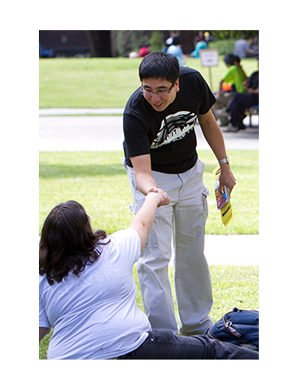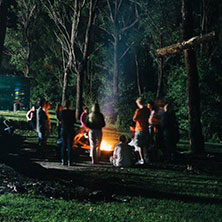Why Start with Evangelism?
Evangelism Sets the Flavour of the Movement:
Honey vs Lemon Juice
When I caught a cold as a child, my mother would make me a soothing cup of hot honey lemon tea. The lemon juice cleansed the back of my throat and gave me a medicinal dose of vitamin C, and the honey made the lemon juice go down easier. Now that I’m a pre-diabetic grown- up, I have to face the fact that honey is a luxury, an optional extra to tickle my taste buds. It’s actually the lemon juice that is doing the hard work to fight my cold. It was the lemon juice that built my immunity and infused me with vitamins.
If you want evangelism to be a central component of your movement, it must be dominant from the beginning. It sets the flavour and the tone. Christians won’t adopt it later. Perhaps they should, but our experience is that they won’t. That’s because Bible studies and prayer meetings are like honey – thick and rich and sticky with sweet, sweet fellowship. Sweet Christian fellowship overwhelms the palate and leaves you with little interest in the tart lemon juice of evangelism. But if you’ve been sucking on lemons since infancy, it’s not such a stretch to keep that going when you have recruited more lemon-suckers.
Evangelism is one of the major distinguishing factors of a movement, but it’s arguably the hardest thing for many Christians to do. It nudges Christians out of their comfort zones to relate to people who might be a little acerbic themselves. Like sucking on a lemon (or in the northern hemisphere, chowing down on haggis), evangelism is the “dare food” of ministry – it takes courage and initiative and outward focus. But the rewards are sweet and build the body. A group that is growing from new converts is electrifying for older Christians to be in, and can galvanise them to further action.
Trying to Turn Honey-Drippers Into Lemon-Suckers 
It can’t be done. We’ve tried. Here’s what happened many times. Peter (a missionary) was working with student leaders at the University of Adversity (not its real name). They were nice students and they loved God and each other, but it turned out they didn’t have enough of a heart for the lost. Peter used an approach that had worked in America – to start Catalytic with a simple Bible study that didn’t require much preparation. Peter explained to the student leader the purposes of Power to Change, to which they agreed. He even had a level of commitment to evangelism. But by the time he had gathered a posse of six or so Christians, encouraging them to do evangelism became really difficult. By the end of the year, the leader had taken his posse out to do evangelistic questionnaires only twice. Peter realised that it’s next to impossible to expect a group that meets primarily for Bible studies to become committed to evangelism somewhere along the way. Evangelism will just become an add-on rather than the flavour of the group, a tiny splash of lemon juice in a large mug of honey. This is especially important on a catalytic campus where the majority rules. And where flocking together with other birds of a feather quickly becomes the dominant flavour, without missionaries to challenge it. With a missionary team on location, it’s easier to correct direction if it’s askew, but this is very difficult with Catalytic from a distance. On a Catalytic campus, you have to start where you want to end.
Watch out for Long Strong John
At another campus, Peter had a Key Volunteer (KV) who primarily liked leading a fellowship group. As a result, the group became inward focused and closed as they gathered only for Bible studies and support. To make matters worse, along came Long Strong John (not his real name), a strong personality who was long on Bible studies. It was too easy for him to take the group even further down that path. Peter ended up having to give his KV a “we’re going to have to let you go” speech, even though there was no one else to take her place. Neither of them was thrilled about this, but Peter knew it was for the best. And this scenario has also repeated itself many times. This campus went on to be “saved” by an American STINT team who started almost from scratch. Only two of the original group stuck around. They ended up becoming leaders because they demonstrated a heart for evangelism. Starting your group with honey means they won’t adapt to the invigorating taste of lemon. But cut your group’s teeth on lemons, and the honey they lick together later, will be all the sweeter.
By Heather Fletcher, on advice from Cameron Fletcher and Scott Adamson





